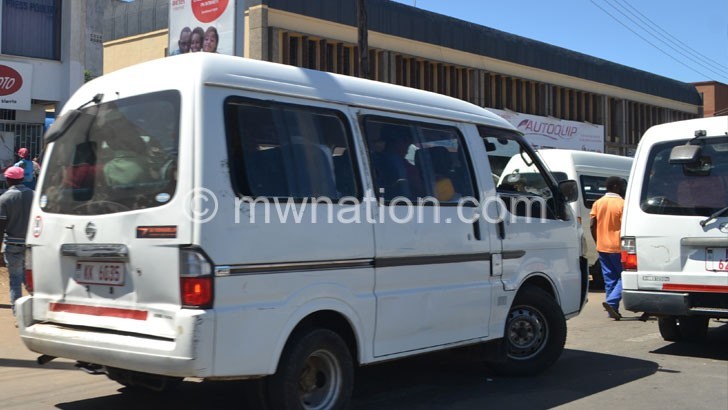Bitter pill
When we met James Walala at Mkwate bus stop in Blantyre’s Machinjiri Township on Wednesday, crowds were walking to work. He had waited at the place for over an hour to find a cheaper ride to Limbe, but none stopped for him.
Since January this year, the economy has been harsh for the accounts assistant who earns about K100 000 a month, an equivalent of four times the country’s minimum wage.
He has watched his static pay’s buying power dwindle by the day, whitewashed by the rising prices of goods and services in the commercial city where one needs almost twice his pay to meet basic needs.

Every morning, bus fares from Machinjiri to Limbe, which have risen from K300 to K400 one-way, remind Walala of the rising cost of living he has to bear as floating petroleum prices keep skyrocketing.
The masses marching past him as he awaits an affordable ride cannot cope with the changing times, they say.
“If we insist on minibuses, what will remain of our meagre pay? How will our families survive?” Henry Mwale asked as he walked to Limbe where he works as shopkeeper.
According to basic-needs-baskets estimates by Centre for Social Concern (CfSC), a family in Blantyre needed no less than K184 000 to meet its basics in September.
The economic think-tank pegged the minimum household budget of K170 000 for Mzuzu, K188 000 for Lilongwe and K177 000 for Zomba.
In an interview yesterday, CfSC director Jos Kuppens said the final consumer will pay a huge price for the increased cost of transport.
“However, the rise will affect rural areas more than urban since they travel longer distances to access goods and services,” he stated.
The rise in electricity tariffs has also been chipping away at the earnings, leaving workers with little to support their families.
Walala, who is well-off by prevailing pay notches gazetted by government, has had to adjust his lifestyle to beat the financial squeeze.
Since July, Malawi Energy Regulatory Authority (Mera) has increased fuel prices three times.
However, minibus owners have responded by slapping commuters with a nearly 75 percent fare hike. Now, commuting to work and back costs K28 000 a month, up from just K16 000 in July when Mera announced the first fuel hike after a long break. Since October 1, the average electricity bills have more than doubled from K2 000 to K5 000 since Escom raised tariffs by 20 percent
“But that is not all. I have to pay house rentals worth K25 000 every month. In some cases, I have to borrow money to supplement my monthly budget, which is not sustainable,” says the father of two.
At work, he has to forgo lunch meals to save money for transport and bread. A loaf has gone up from K500 to K550 partly in response to the surge in power and fuel price.
The fuel price rise has also compelled small-scale businesspeople to dig deeper into their pockets and kick up prices to remain afloat.
Looking downcast soon after alighting a minibus from Namiyango in Blantyre City, Mercy Mwamlima, who owns a clothing shop in Limbe, sums up the situation in one word—“unbearable”.
Mwamlima too has to forego lunch to make up for lost income. At times, she walks home. This may be good for her health, but it makes her angry because it is usually dark when she gets home.
She said: “I feel like exploding with anger at the rate fuel prices are rising.”
In a good month, Mwamlima earns between K100 000 and K110 000.
The struggles of the two personify the hardship faced by people in the country when energy prices rise relentlessly.
On Friday, the population had a rude awakening when Mera announced the third adjustment of fuel pump prices this year. It came at a time people are grappling with rising prices of electrify and water.
Mustapha Hussein, a political analyst at Chancellor College, said in an earlier interview that with six months to the May 21 Tripartite Elections, the price increments and implications could decampaign President Peter Mutharika and his governing Democratic Progressive Party (DPP).





